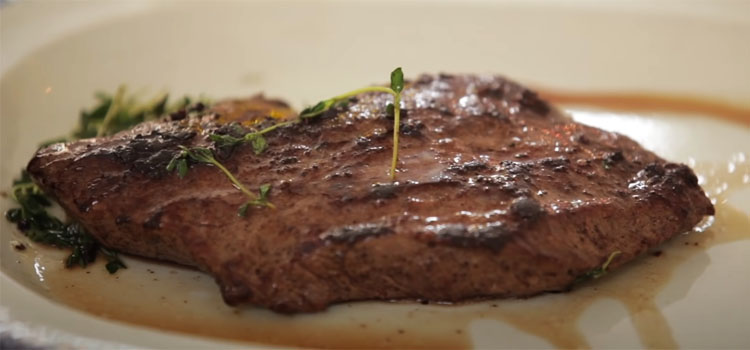Last Updated on September 16, 2024 by Shari Mason
Ever opened a pack of steak and smelled something like **eggs**? Guess what, you’re definitely not alone!
While I also anticipate a fresh, meaty scent, sometimes what greets my nostrils is far from appetizing.
So why does steak smell like eggs?
Let’s dive into the reasons behind this puzzling aroma, ensuring you’ll know exactly what’s at play the next time you’re faced with an eggy-smelling steak.
Why Might My Steak Have An Eggy Smell?


When your steak [1] exudes an “eggy” aroma, it typically indicates the presence of sulfur compounds.
These compounds can originate from various sources: the cattle’s diet, the meat’s processing, or, most commonly, the growth of certain bacteria on the steak.
“If you got a good steak you don’t need A1 sauce.”
– Joe Burrow, American Football Quarterback
Over time, especially if the meat is not stored correctly, these bacteria multiply and break down the steak’s natural juices, producing sulfur compounds that give off that distinctive eggy smell. This can be an early sign of spoilage.
Related Articles:
- How To Get Steak To Room Temperature Quickly?
- Do You Rinse Salt Off Steak Before Cooking?
- Is Steak Turns Brown in The Fridge, Is It Bad?
Does An Eggy Smell Indicate The Steak Is Spoiled?
An eggy smell on a steak often suggests the presence of sulfur compounds, which arise from the growth of specific bacteria on the meat.
While this odor can indicate the onset of spoilage, it doesn’t necessarily mean the steak is unsafe to eat.
However, pairing your sense of smell with visual and tactile inspections is crucial. If the steak has a slimy texture, other off-odors, or discolorations, it’s best to err on caution and discard it.
How Can I Ensure The Freshness Of My Steak?
- Purchase Date: Buy steak well within its “sell-by” or “use-by” date.
- Color Inspection: Fresh steak should have a bright red hue, not brown or gray.
- Packaging: Ensure the packaging is tight and not damaged. Vacuum-sealed packs should not have air pockets.
- Odor: Always check for off-odors when you open the packaging.
- Texture: The meat should be firm to the touch, not slimy or tacky.
- Storage: Refrigerate promptly, preferably below 40°F (4°C).
- Freezing: For extended storage, freeze steak, ensuring it’s wrapped tightly to prevent freezer burn.
- Thawing: Always thaw meat in the refrigerator, never at room temperature.
- Purchase Source: Buy from reputable sources and butchers known for good turnover and quality products.
- Use Quickly: Once purchased, aim to use the steak within a few days for optimum freshness.
Can Cooking Remove The Eggy Odor From The Steak?


Cooking the steak can reduce or mask some of the eggy odor, but it doesn’t necessarily eliminate it.
If the smell results from bacteria or spoilage, cooking will kill the bacteria but might not eliminate the off-putting scent.
“When the aroma of eggs meets the realm of steak, it’s not a culinary blend, but a momentary mystery waiting to be unveiled.”
– Eat Pallet Restaurant & Food Advice
Furthermore, if the odor is due to spoilage, merely cooking the meat doesn’t ensure its safety for consumption.
It’s always best to prioritize safety and avoid eating steak that emits an unusual or off-putting smell, even after it’s been cooked.
Health Risks Associated With Consuming Steak That Has An Eggy Scent
- Bacterial Contamination: The eggy smell can indicate the growth of bacteria on the steak. Consuming contaminated meat can result in foodborne illnesses.
- Common pathogens like Salmonella [2], E. coli, and Listeria can proliferate on spoiled meat. These bacteria can cause symptoms ranging from mild stomach cramps to severe diarrhea, vomiting, and even life-threatening conditions.
- Toxin Production: Even if you cook the meat thoroughly and kill bacteria, some bacteria produce toxins as they grow, which can remain in the meat.
- Cooking might kill bacteria, but it doesn’t necessarily neutralize the toxins they’ve produced. Consuming toxin-laden meat can still result in sickness.
- Digestive Issues: Even if not heavily contaminated with pathogens, Spoiled steak can be challenging for the digestive system.
- After consuming meat, many people might experience stomach upset, indigestion, or mild food poisoning symptoms.
- Decreased Nutrient Content: The quality of the steak deteriorates as it spoils.
- With spoilage, some of the beneficial nutrients in steak can break down, making it less nutritious than fresh meat.
- Risk of Cross-contamination: Handling spoiled steak can spread harmful bacteria to other foods, surfaces, or utensils.
- Even if you decide not to consume the steak, without proper handling and cleaning, you can inadvertently spread bacteria to other food items or kitchen surfaces, putting other foods at risk.
FAQs
u003cstrongu003eWhy does steak smell like sulfur?u003c/strongu003e
Steak can sometimes smell like sulfur due to the presence of amino acids that break down and release sulfur compounds during the aging or spoilage process. u003cbru003eu003cbru003eA steak with a strong sulfur or u0022eggyu0022 odor may indicate bacterial growth and potential spoilage. Always inspect meat thoroughly before consumption.
u003cstrongu003eCan I eat steak if it smells?u003c/strongu003e
No, if a steak has an off or unpleasant smell, it’s best to avoid caution and not consume it, as it may be spoiled or contaminated.
Key Takeaways
The distinctive eggy scent that some steaks exude can be disconcerting, often attributed to the presence of sulfur compounds.
While various factors can lead to this odor, it’s crucial to differentiate between normal meat odors and those indicating spoilage.
It’s always advisable to prioritize safety and freshness when handling and consuming meat products. If you doubt the steak’s quality, avoiding consumption is better than risking potential health issues.
References:
- https://www.foodandwine.com/meat-poultry/beef/best-steak-recipes
- https://www.mayoclinic.org/diseases-conditions/salmonella/symptoms-causes/syc-20355329
- Can You Put an AC Unit in the Kitchen? - September 27, 2024
- What Cheese Does Olive Garden Use? Discover Their Signature - September 27, 2024
- How to Cancel a Pizza Hut Order? Quick & Easy Guide - September 24, 2024


